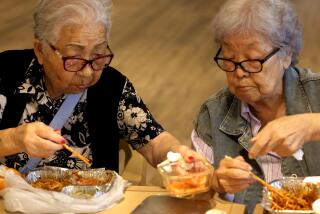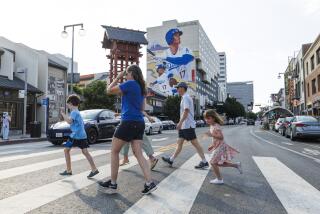Breathing new life into Little Tokyo
Mason Keefe never used to come to Little Tokyo. The Burbank teenagerâs most prominent cultural influence was her motherâs Texan background; Japan was a distant country.
But two years ago, the 14-year-oldâs passion for comic books led to the discovery of Japanese manga, which fueled an obsession with Japan. Now she adores sushi. She studies Japanese. And she comes to Little Tokyo regularly â most recently this past weekend to check out Little Tokyo Design Week, a five-day festival showcasing Japanâs cutting-edge design, technology and pop culture.
Featuring baby seal robots, eco-friendly homes and other inventive products, Design Week, which ran through Sunday, was aimed at expanding Little Tokyoâs appeal to new kinds of visitors like Mason. As the historic heart of the Japanese American community, Little Tokyo is best known for its iconic reflections of traditional culture: the Buddhist temples and Japanese gardens, the kimono and rice cake shops, the sushi and noodle restaurants.
But Design Week organizer Hitoshi Abe, the Japan-born chairman of the UCLA architecture and urban design department, thinks itâs time to update the neighborhood with Japanâs imaginative modern culture. In doing so, he and other festival sponsors hope that Little Tokyo can attract a younger, multiethnic crowd to help sustain the neighborhood first settled a century ago by issei immigrants but largely vacated by their children.
âMaybe we need a new identity for Little Tokyo that will bond people and open it up to a larger and more multiethnic group of people,â Abe said. âWe thought the design culture from Japan might be one key, since so many people love it.â
Abe and other organizers are also aiming to lure back Japanese businesses, many of which left Little Tokyo after the recession of the 1990s. The neighborhoodâs proximity to the downtown arts district, along with museums and cultural centers, could make it a testing ground for Japanese design products, he said.
A possible collaborator is Daiwa House Industry Co. Ltd., a major Japanese home builder that chose the festival for its global debut of a high-tech, green emergency shelter. The futuristic prototype is equipped with solar energy panels, a lithium-ion battery, a satellite communications system, an LED lighting system and other green technology. The firm entered the U.S. market in April with a San Jose office and eventually hopes to expand to Los Angeles, according to Daiwa House exhibitor Yuki Hirata.
âAll Japanese companies have to support Little Tokyo and help it grow more,â she said. âHopefully we can contribute.â
The firm also displayed the crowd favorite: a baby seal robot. The furry white robot, developed as âpet therapyâ for the elderly, blinks its enormous black eyes, rolls its head and chirps â drawing gushy hugs even from grown men.
âI have to have one!â said H Clark, a 33-year-old student at the Southern California Institute of Architecture, one of several partners involved in Design Week. âThe technology is crazy!â
Design Week also featured more than 15 cargo containers transformed into mini-galleries displaying other robots, anime clips, architectural models and Japanese pop cultural goods. A few galleries focused on Japanâs March 11 earthquake and tsunami â one displaying disaster supplies crafted from everyday items, such as water filters from plastic bottles filled with pebbles and leaves.
Daily symposiums focused on the eventâs âFuture Cityâ theme, with speakers exploring Japanâs contributions to urban design. At night, hundreds thronged to the Japanese American Cultural & Community Centerâs plaza to watch an outdoor screening of the Japanese animated classic, âMy Neighbor Totoro,â on Friday and big-screen video presentations of artistic visions for future cities on Saturday.
The festival was sponsored in part by Toyota, All Nippon Airways and the Los Angeles County Metropolitan Transportation Authority. It brought together Little Tokyoâs major cultural institutions with design schools at UCLA, USC, SCI-Arc and Art Center College of Design for the first time.
âLittle Tokyo is on the verge of reinventing itself as a place not only of history and traditional culture but also contemporary culture, which a lot of young people are really interested in,â said Chris Aihara, executive director of the Japanese American cultural center. âItâs not rejecting what we are, itâs expanding what we are.â
More to Read
Sign up for Essential California
The most important California stories and recommendations in your inbox every morning.
You may occasionally receive promotional content from the Los Angeles Times.











